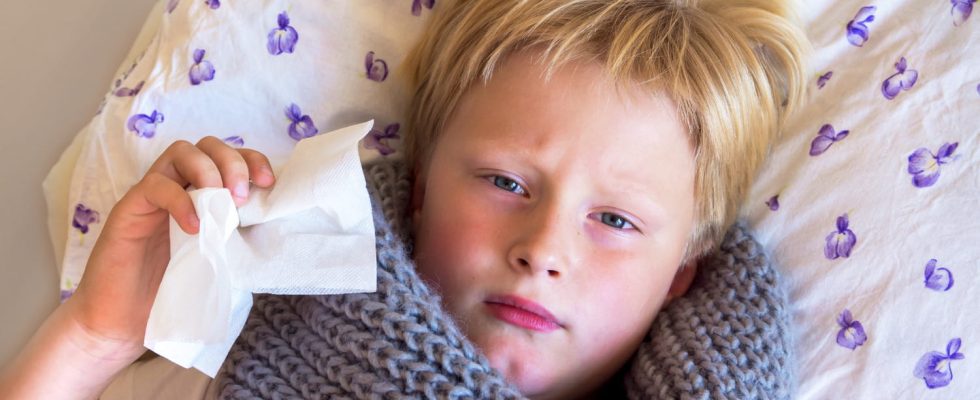An increase in cases of whooping cough is currently observed in France and a 3-week-old infant died in Nice in April 2024.In the first quarter of 2024, around fifteen clusters, mainly in communities (nursery schools, primary schools, daycare centers and nursery homes) but also in families, and totaling 70 cases were reported“, details Public health France in its bulletin of April 18. Whooping cough progresses in cycles of recrudescence every 3 to 5 years. Due to the bacterium Bordetella pertussisalso called bacillus of Bordet and Gengouthis disease is particularly dangerous for unvaccinated infants (under 6 months), but can also affect adults whose vaccinations are no longer up to date. Whooping cough can be serious in infants and can cause difficulty breathing which can lead to cyanosis, respiratory blockage or pulmonary complications requiring emergency hospitalization. Neurological complications can also occur.
A pharmacy test?
The diagnosis of whooping cough is based on carrying out a PCR test which is the most sensitive to the bacteria. This test carried out in the laboratory (and not in a pharmacy) is prescribed by the doctor for a patient whose cough has lasted for at least 15 days-3 weeks. It is reimbursed by Health Insurance. Blood testing to perform pertussis serology is no longer recommended.
Is it contagious ? When especially?
Whooping cough is a very contagious disease. According to Public Health France, a person suffering from whooping cough contaminates 15 on average. Transmission is airborne and occurs through contact with a sick person with a cough. There Contagiousness is maximum the first week. It then decreases over time to be considered as zero after 3 weeks progression without antibiotic treatment or after 3 to 5 days of antibiotic therapy depending on the antibiotic chosen. The sick person must isolate yourself and avoid communities for 3 weeks after the onset of symptoms if no appropriate antibiotic treatment is prescribed or until the 3rd or 5th day of treatment depending on the antibiotic selected.
What are the symptoms of whooping cough?
Diagnosis of whooping cough is often late because its symptoms resemble those of a respiratory illness. banal. The incubation period for whooping cough is approximately 10 days (from 7 days to 21 days maximum).
► At first: symptoms of a cold
► After about ten days of the so-called catarrhal phase, the disease enters its critical phasewith a cough that persists and gets worse (especially the nightby straights). THE Cough characteristics gradually increase in intensity and frequency, and become exhausting, without effective inspiratory recovery.
► The symptoms are much less spectacular in adultsthe disease can be minimally symptomatic (vaccination alleviates the symptoms).
The pattern of fifths is typical in whooping cough:
► A period of agitation then deep inspiration followed by coughing movements, up to 20 in a row sometimes, accompanied by a feeling of suffocation,
► A big, noisy breath called inspiratory recovery and resembling rooster crowing, giving its name to the disease, ends the sequence. The repetition of several of these sequences defines the fifth.
What bacteria causes whooping cough?
Whooping cough is a bacterial infection. Two bacteria of the Bordetella genus are responsible for pertussis syndromes in humans: mainly Bordetella pertussis And Bordetella parapertussis. In almost 8 out of 10 cases, the baby is infected by someone close to them, such as their parents or grandparents.
What are the complications of whooping cough?
Whooping cough can cause more or less serious complications:
- pneumonia, which can be severe and require emergency hospitalization.
- acute otitis media.
- seizures or encephalopathy. These complications can leave permanent after-effects.
- Death from acute respiratory distress is unfortunately not uncommon in infants under 6 months of age.
How to treat whooping cough?
Antibiotic treatment is recommended in first 3 weeks of evolution and allows to quickly reduce contagiousness. Among the antibiotics prescribed for whooping cough: azithromycin and clarithromycin (both can be prescribed to a pregnant woman). In case of contraindication in the pregnant womanTHE cotrimoxazole can be used but its use should be avoided during the first 10 weeks of amenorrhea or combined with folic acid supplementation. THE patients must be isolated in order to prevent any contamination, for 3 to 5 days depending on the antibiotic treatment implemented. Other therapies (bronchodilators, corticosteroids, etc.) remain discussed during whooping cough. THE cough suppressants are completely ineffective. Hospitalization is strongly recommended for children from 0 to 3 months to implement cardio-respiratory monitoring.
LThe family circle, not or no longer protected by vaccination, must be treated preventively with antibiotics. Same thing for fragile cases (unvaccinated infants, pregnant women, parents of unvaccinated infants, etc.). In this case, it must be administered as soon as possible after infection and, maximum, 21 days after contact with an index case during a contagious period.
Should adults get vaccinated against whooping cough?
The whooping cough vaccine is compulsory for children since 2018. THE booster vaccination is indicated in all adults at the age of 25 (one dose with a DTPaPolio vaccine) if no pertussis vaccination in the last 5 years. Vaccination is also recommended during pregnancy (since 2022), during the second trimester. The HAS specifies that it is necessary to vaccinate the woman during each of her pregnancies. Indeed, if the mother was vaccinated before pregnancy, the concentration of maternal antibodies is insufficient to ensure passive protection of infants. Prevention involves vaccination of infants. A vaccination schedule has been put in place in France. Pertussis valence is administered at 2 and 4 months then 1 booster at 11 months, 6 years and between 11 and 13 years.
